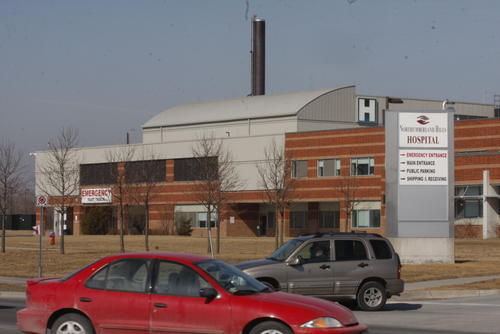People will drive up to Northumberland Hills Hospital one day to find the windows shuttered and the doors locked and then it will be too late to complain about the future of our hospital, an angry senior said quietly under his breath the other day in conversation.
It is a depressing prediction. But, it is not true. Yet.
The state of local healthcare was the subject of a public forum held at Carpenter’s District Council union hall on Croft Street in Port Hope Saturday. About 30 people gathered in the morning to hear an expert panel consisting of Ontario Health Coalition Executive Director Natalie Mehra, Ontario Coalition Against Poverty organizer John Clarke and Advocacy for the Elderly Executive Director Judith Wahl.
The message of staff reductions, fewer beds, reduced services and budget crunching were nothing new to the audience. Unlike previous years, when the bad news flowed from the hospital like blood spewing from a major artery, this year the situation is so dire the hospital board keeps trying to buy time to find solutions that will not completely gut it.
The powerhouse panel did not pull any punches outlining the declining state of Ontario healthcare, providing many heartbreaking and terrifying stories from across the province.
There was a story about an elderly woman in need of long-term care who was sent to a long-term care facility 400 kilometres away far from family and friends because it was the bed available.
Then, there was the story about the families in Leamington, Ontario, who are fighting the closure of the birthing centre. If they lose, it means expectant mothers will be forced to drive nearly an hour to Windsor. The spectre of women giving birth at the side of the road was made very plain.
And, these are only a few of the stories.
Dramatic cutbacks are the hallmark of the current surge by the Local Integrated Health Networks (LHIN) in rural Ontario. Medium-sized hospitals like Cobourg and Trenton, have a jackboot on their proverbial throats as the LHINs presses down on local boards and administrators. Only last week, Quinte Health Care announced its plans to cut $4 million from its budget, by reducing staffing, beds and altering services. Trenton residents are up in arms trying to save their hospital.
The panelists urged the crowd to mobilize. But, nobody was quick to jump up to lead the charge.
To gather in front of the hospital on DePalma Drive may seem a bit too obvious. And, it also seems a bit unfair at this point. If anything is apparent during this round of budget slashing, the LHIN’s heavy hand is more obvious than in the past.
It is hard to tell what is really going on since most of the discussions are happening behind closed doors. Then again, the LHIN functions in secrecy. Its meetings with the hospital board over the budget cuts are not public. When you go to any LHIN meeting, you are only an observer. There is no opportunity to speak to them directly at a meeting. Public consultations are only about what they want to discuss, not what issues we want to bring up. So if we want to address them about the cuts, forget it.
All LHIN board members are appointed. There is no local accountability. No one from Northumberland sits on the board (when the local representative left, they were not replaced with anyone from the area).
The local hospital board and the administration are hogtied. They have few, if any choices, as the LHIN drops the hammer hard. Its interventionist approach this time round is blatant. And, no matter what anyone thinks, the board members and administrators cannot speak out publicly for fear of backlash or retribution.
So, it is left to the community. During the last major cuts five years ago, business leaders, municipal politicians and others came together to mount a protest with the residents. They were able to blunt the cuts, but not everything was saved.
If the 60,000 residents who use Northumberland Hills Hospital don’t want to lose it, now is the time to act. To wait until the operational review is done will be far too late. And, it is going to take more than a few picket lines. The LHIN must be made to shake in its boots in order to back off. And that is a level of accountability desperately needed.
Besides, with the millions of dollars people have donated to the hospital, along with the thousands of hours generously provided by all the volunteers, the LHIN needs to get a really clear message: it is our hospital, not yours.



